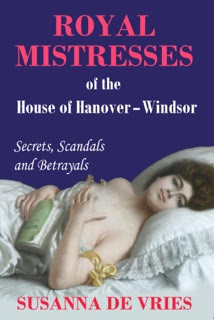(Imported from Blogger; formatting glitches need to be fixed)
Susanna de Vries is well known for her championing of Australian women in history. Today’s guest reviewer, National Year of Reading Ambassador Hazel Edwards, has chosen to review de Vries’ new nonfiction title, Royal
Mistresses of the House of Hanover-Windsor: Secrets, Scandals and Betrayals.
provides a vacancy for a mistress.’
Translation of an old French proverb.
William and Kate seems a love match. Charles’ marriage with Diana was arranged. His ancestors (Hanover to Windsor name
change during wartime to remove the apparent Germanic link) married Protestant,
European aristocracy for love-less, political reasons, and then kept multiple mistresses.
 Former royal marriages were
Former royal marriages werepolitical and religious property arrangements involving land, big dowries,
titles and the need for healthy, legitimate male heirs. The trade of Royal Mistress was
precarious, but recognised with temporary prestige and social acceptance. Thus many of the mistresses sought to
accumulate jewels and money before falling from favour and being replaced by a
younger model.
confusion of titles and names, de Vries tells a readable story, clarifying the
roles and contexts. The various, former
‘Princes’ (plural) of Wales seemed to suffer from over- indulgence, lack of a
job and the need for the constant attention of a mother-lover mistress who would
tolerate gambling, drinking, over-eating and provide all kinds of entertainment
to relieve boredom.
royalty was a short-term occupation: with easy falls from favour. Hard to say
‘no’ to an all powerful, potential ruler who could ostracise you into poverty,
or make your fortune, by providing access to him.
reliant on financial handouts, usually in the form of jewellery, they seemed
mercenary, but didn’t have many other options. Even if they were personable and intelligent, (as well as
beautiful and accommodating) they were rarely independent financially. And if a
child had to be supported, as in the case of Perdita Robinson who originally
had paid work as an actor, and was forced by Prince George of Wales to give up
her career, she still lost out on the promised house he was going to gift her.
Others had multiple illegitimate children to aristocratic lovers and since DNA
testing was not used then, the parent was problematic. Some claimed to be Royal
bastards. And others were.
princes ran up big debts against their eventual gaining of the throne, and had
to marry Protestant princesses with big dowries, despite being fond of their
mistresses. Religion was an important variable, but money was greater.
a trade. But with no trade union. So, many mistresses spent up quickly, on
clothes and fashionable property while they could.
familiar with the relationship of Mrs Wallis Simpson and Edward, or Camilla and
Prince Charles, both of which are interesting chapters with new content.
known, married mistresses appeared to have a genuine fondness for their prince
and tried to keep him healthier and doing some actual kingly business. Many retiring husbands appeared to
benefit financially or politically from their wife becoming the royal mistress.
Winston Churchill’s
mother Lady Jennie Churchill, and the heiress, Daisy, Countess of Warwick who
in later life created worthwhile occupations for herself, make fascinating
reading. Alice Keppel became the love of Edward’s life and the great
grandmother of Mrs Camilla Parker Bowles, now Duchess of Cornwall. Camilla’s
story and that of her Aussie rival, Lady Dale Tryon are included.
having suffered an attack of mumps that ensured he remained physically and
mentally immature and obsessively dependent upon manipulative Mrs Simpson.
will attract readers, as will the subtitle of ‘Secrets, Scandal and Betrayals’
but de Vries’ ‘readability’ in portraying well researched history in an
accessible fashion for the general reader, make all her books the kind that
avid readers share.De Vries is especially good at placing her characters in context. The endnotes are well documented and the index works, and the photos indicate the beauty of some of the mistresses. But I found it hard to be sympathetic to the expensive mistress lifestyle and aristocratic spending when the general population was struggling, and this included tenants providing the income from the Prince of Wales’ estates. I preferred reading about the heroic women in de Vries’ other histories of significant working women during wartime and pioneering times.
As well as being a well-known children’s writer, Hazel Edwards is the author of Writing a Non Boring Family
History. She has also contributed to the Aussie Heroes series with Sir Edward
‘Weary Dunlop’ and Professor Fred Hollows.
de Vries, Susanna, Royal Mistresses of the House of Hanover-Windsor: Secrets, Scandals and Betrayals ($34.95) ISBN: 978-0-9806216-2-1, First Published 2012
Other books by Susanna de Vries:





